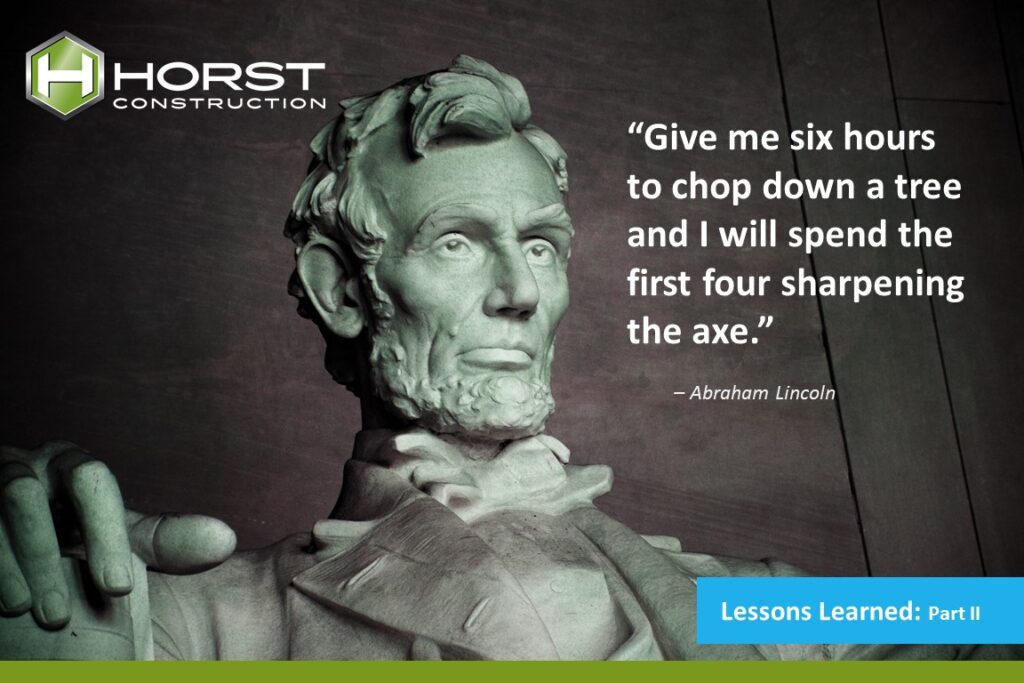Lessons Learned Part II

VALUABLE INSIGHTS FOR THE BEGINNING STAGES OF YOUR PROJECT!
Two months ago, we polled our Project Management team to gather their biggest lessons learned throughout challenging construction projects. We mined so much valuable information that we decided to split it into a 3-part series. In case you missed Part I, you can check it out here. In this article, we focus on the lessons our team has learned about starting a project out on the right foot.
AT THE BEGINNING OF A PROJECT, YOU DON’T KNOW WHAT YOU DON’T KNOW.
Even those Owners who have gone through significant construction projects in the past have learned the hard way that each project has it’s own nuances. From land development to clarity of project documents, here is what our Project Managers had to share that can help you make good decisions in the beginning stages of your project.
Bring in the experts.
Building your construction team as early as possible will give all participants the opportunity to provide you with valuable information that could greatly benefit your project. We are not just saying this because we are proponents of the Design-Build method; having a qualified and dedicated team at the beginning of your project can save you a lot of headaches – not to mention time and money – down the road. Your team can provide options for new ideas, products, or methods that you may not be aware of. They will give insights into value engineering opportunities and clarify design documents, all while maintaining a focus on your project goals. Furthermore, they can provide an overview of preventative maintenance and life cycle information, giving you a head’s up of what to expect once you are physically in your new building or space.
“Selecting a team of experts when the project is still in design is advantageous in developing a ‘work smarter’ approach. It allows for valuable discussions about design intent and encourages steering through the project together as a unified team.” – Ted Miller, Senior Project Manager
Land development and permits.
One area that often catches people by surprise is land development. Even on projects where it seems that there will be little site work necessary, getting through the red tape of the land development process can require some finesse. It is not uncommon for this portion of the project process to take six months to a year, and in some cases it has pushed projects out by several years – or caused them to be abandoned all together. Navigating the process of zoning, permitting, municipality requirements, and legal approvals can be exhausting. Starting the process much earlier than you think necessary and being well informed about the specific requirements will help keep your project moving along toward the finish line. For some more information about this topic, you can check out the article Project Manager Dwayne Hoover wrote here.
Homework helps you ace the test.
Much like school children are encouraged to do their homework so they can master the material and ace the test, successful construction projects require some studying. Your construction team should know the project inside and out before the work even begins on a job site. Looking far ahead and working your way back enables you to circumvent the possible pitfalls and design a schedule that meets your project’s individual needs.
“Planning way ahead is a skill that proves invaluable from the beginning of a project through to the end. Proactively thinking ahead about potential scenarios allows the project to be scheduled and managed in a way that really helps to keep the critical items moving along according to an Owner’s time frame and necessary scheduling milestones. Determining how you might handle certain issues should they arise gives you the foresight to plan for the worst and could save a project from sliding out from under you.” – Jake Moyer, Senior Project Manager
Documentation.
Having well-prepared documents that are specific to the project and have been thoroughly reviewed will lead to a better-managed project. The language used in these documents will provide the basis for which each discipline plans for the project. Documents should be written with clear expectations laid out and meticulous attention to detail. Sometimes in the development of bidding documents, specifications are not reviewed as exhaustively as they should be and items that are cut and pasted from past projects manage to slip by. Vague or incorrect documents lead to an owner getting results that are all over the place. The way each contractor interprets vague information will lead to a less-than equal proposal process. Without document clarity, you will never get an apples-to-apples analysis. Too often contractors who are asked to “bid” a project against one another will interpret vague specifications in self-serving ways that lead to change orders for the owner. If this sounds like a nightmare to you, we would be happy to discuss other approaches that eliminate or at least decrease that possibility.
Great expectations.
Last, but certainly not least, is the importance of having realistic expectations for your project. Unfortunately, most projects hit bumps in the road or encounter unforeseen circumstances. The job of your construction team is to help you navigate the process as painlessly as possible. Select a team that you trust and have an open dialogue about your needs and priorities for your project. They will be able to guide you on the ways to best achieve your building goals.
Horst Construction is proud to provide our clients with comprehensive, honest, and straight-forward information and deliver a “no surprises” construction experience. We would love the opportunity to discuss your project goals and how to best match your vision with your resources. Please feel free to contact us to schedule a phone call or consultation. Download a PDF version of this article.
Posted December 03, 2019

